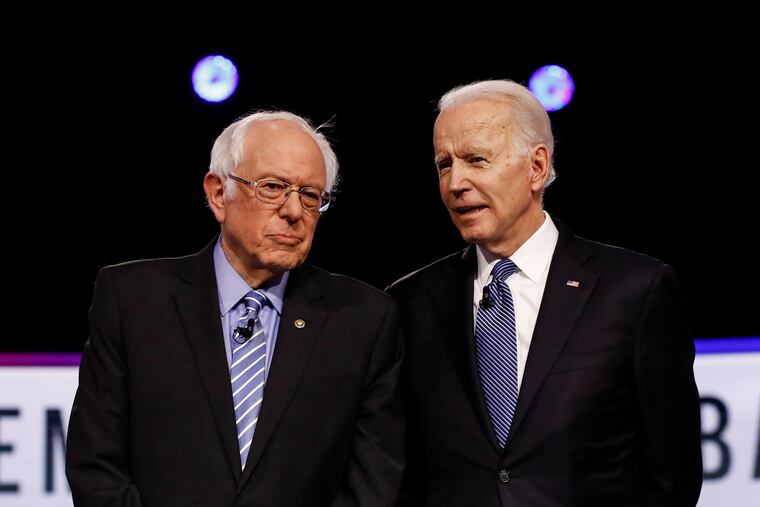Biden-Sanders group serves familiar Democratic proposals
A review of the emerging Democratic Presidential platform suggests Bernie Sanders hasn't driven Joe Biden too far left where it counts for the financial economy.

Despite expectations “that a collaboration between former Vice President Joseph Biden and U.S. Sen. Bernie Sanders would drag Mr. Biden sharply left,” the actual document produced by the Biden-Sanders Unity Task Force “fell flat” for leftist hopes, New York investment bank Keefe Bruyette & Woods said Monday.
The Biden-Sanders task force’s recommendations were “light on specifics” and “positive” for what they didn’t say from the point of view of the powerful U.S. financial industry, a team of Keefe Bruyette & Woods analysts headed by Washington-based Brian Gardner told clients of the investment bank in a report.
The Biden-Sanders Unity report, named after the presumptive Democratic presidential candidate and his onetime rival, was mum about forcing private-equity billionaires to pay the same tax rates that other people pay. It includes no fiduciary rule requiring financial advisers to serve clients instead of themselves.
The group did endorse a couple of crowd-pleaser banking-for-everyone proposals: a Post Office banking system (common in Europe and Asia) and a Federal Reserve real-time payments system that would give the many Americans who live paycheck to paycheck faster access to their funds.
”But it did not propose breaking up the big banks,” or even making them hold more capital, Gardner noted. Jamie Dimon’s JPMorgan, Chase & Co, the biggest, richest, most profitable U.S. bank, is safe with Biden, if Dimon takes his fellow Democrat at his word.
The center-left “unity” group that set the joint financial policy recommendations included labor union presidents Sara Nelson (Association of Flight Attendants) and Lee Saunders (American Federation of State, County and Municipal Employees); U.S. Rep. Karen Bass (D., Calif.), chair of the Congressional Black Caucus; and zero business people.
Five economists in the group are former Biden aides Jared Bernstein and Ben Harris; Ohio State “stratification economist” Darrick Hamilton; former Sanders adviser Stephanie Kelton; and former Obama aide Sonal Shah.
Though the report was vague on the point, Gardner expects that a President Biden will unwrap Trump’s restrictions from the Consumer Financial Protection Bureau and appoint an ally of its founding advocate, U.S. Sen. Elizabeth Warren (D., Mass.), to sue and pressure “student loan servicers, mortgage servicers, credit card companies, payday lenders, installment lenders, debt collectors, and credit reporting agencies” to cut fees and hassle for hard-pressed borrowers, at the expense of the companies’ owners.
The Democrats also called for renewed enforcement of anti-racial discrimination laws for mortgage lenders “as expected” from Democrats, Gardner noted.
But the group had nothing to say about Fannie Mae and Freddie Mac, the government-subsidized mortgage finance giants that are the subject of much heat and little light in reform proposals by bankers and bank critics alike. In short, KBW concluded, “the Biden campaign’s message on housing policy” is “muddled.”
Biden won a little arm-wrestling match on student loans: The report endorsed his most recent proposals to forgive student loans for public (but not most private) college graduates earning less than $125,000 a year. Sanders (and Warren) would have forgiven private-college debt, too.
All this is more than Democratic wishful thinking because Biden is way ahead in early polls. But he could still blow the election, Gardner wrote, if his further-left allies scare middle-American voters into worrying about government takeovers or a breakdown in public order.
What about a Democratic Congress? That “could make it easier to raise corporate taxes or impose a financial transaction tax,” but Gardner said Democrats will need help getting that through the Senate, where some members of both parties are close to the banks (as Biden was in his Senate days).
Biden has separately proposed returning corporate income tax rates to 28% from 21%, raising the top rate to 39.6% from 37%, and taxing wealthier earners’ income above $400,000 to the 12.4% Social Security payroll tax split by workers and bosses.
The KBW analysts said China is unlikely to cut a trade deal with a one-term President Biden, though Biden is likely to mend fences with Europe.
The stock market doesn’t seem to be pricing in a Biden victory or the threat of higher taxes and more regulation for many U.S. companies. If his polls hold up, Biden could prevent a market panic by naming “an establishment Democrat” as Treasury secretary, but he will need to promise progressives some plumb jobs — for example at Warren’s Consumer Financial Protection Bureau, the KBW team said.
A Trump reelection could occur if Biden voters fail to turn out, the coronavirus recession eases, or the president scares voters into worrying about a weak Biden presidency. A Trump victory would boost Wall Street financial stocks and possibly speed a trade deal with the United Kingdom, at least.
Gardner considers Biden and a Democratic Congress more likely than Trump and the GOP to finally win Congress’ approval of a big infrastructure spending program — if only because, after massive deficit spending to combat coronavirus shutdowns, congressional Republicans have warned that they will resist more of the same.